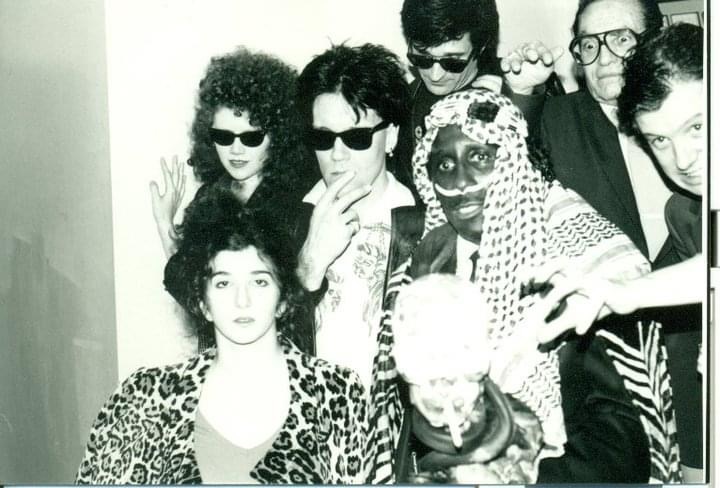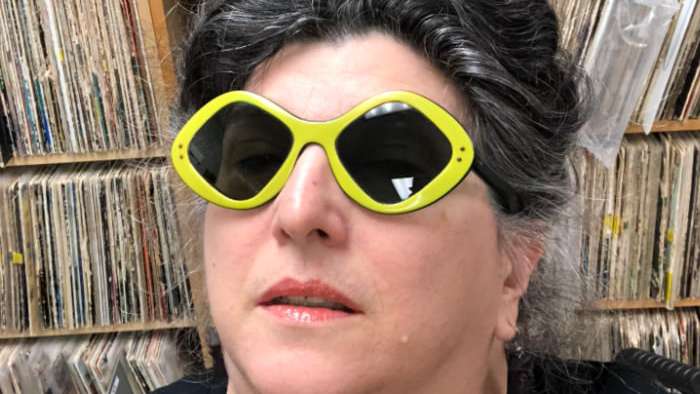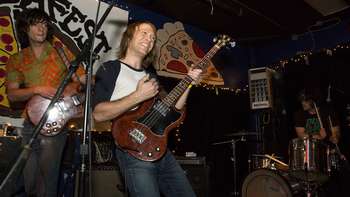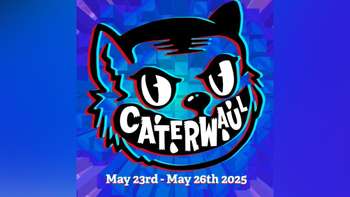
Scene Point Blank: Since we're on the subject, let’s dive into one of the stories I read in your LA Weekly profile. What’s the story behind Joey Ramone showing up to the station drunk when you were wrapping up your show?
Stella: That’s in the LA Weekly? I can’t remember. My friend Karen Butler tells me she’s seen a photograph of Joey Ramone in the studio with me. I’m saying, “Are you sure?” She’s never been able to find it since. Are you sure? It must have been from someone coming from or going to LAX, and they had him with them and stopped in from there because I don’t remember this. He must have been tagging along with someone else. Back in the day, it was mayhem in the station with people dropping by, someone tagging along, etc. I really want to know because Karen saw this photograph and I don’t remember!
Scene Point Blank: What's the most challenging part about this job that nobody else sees but you? What advice or words can you tell the publicity and radio promo folks who will read this on how they can make your job as effortless as possible?
Stella: I want a CD, don't send me a download link. I don't care if it's a burned CD. What am I, a dub lab? I still don't have a functional computer at home because that took a crap during the pandemic, and I began slowly but surely realizing how much I can do on my iPhone. When Stray Pop went to automation, that was done as a coordinated effort between Reverend Dan and me between his computer for WeTransfer uploading and me emailing him pictures of each other's notes, photos of playlists, etc. Vinyl takes up a lot of space. My friend Lee once told me that vinyl weighs less than a CD, and I don't know about that. But volume-wise, vinyl is just a pain. When I moved from my dad's house in 1987, it took me 8 hours to box the LPs. Kids love vinyl these days; wait until they have to move a few times. That could change their minds. At least with CDs, you can make another copy and create a digital music database for backup. I've lost CD bags that have had some killer stuff in the past. My primo CD bag got lost when I emptied the car trunk on campus to find a spare tire to replace a flat, and Reverend Dan saved me for some of the lost stuff with his copies. Like Alice Bag and Vaginal Davis's band, Cholita: he had a copy of their album on hand, and thank god. Many CDs were in that bag, and he was slowly making replacement copies, so I swear by CDs. I may start doing this more digitally one day. But making a digital copy of an LP or a 45? Forget it. It’s too labor intensive. There are things you can find on a CD that isn't available on vinyl, like 20 CDs of Disneyland ride audio. [Laughs.]
Scene Point Blank: What are your thoughts on AI’s emergence, and have you given this technology any thoughts or ideas about what its impact on radio programming could be in the future?
Stella: I think we might already have some of it working to an extent in radio, but I’m not sure how and where. How YouTube’s and Spotify’s algorithms work to recommend different music isn’t AI, though. I know they’re making music suggestions to people who use those services, and it’s pretty good. I don’t have a Spotify account out of principle -- they really don’t pay the majority crap. They give millions of dollars to some asshole podcaster, and an artist’s stream rate per play is fractions of a penny. Even Flo & Eddie sued Sirius XM in Florida, California, and New York state courts because they wouldn’t pay performance royalties for music recorded before 1972.
Scene Point Blank: Have KXLU DJs through the years often sought you out for any advice on best practices to implement in their own show?
Stella: Not too much, because I’m in the station late Friday night. Some kids have asked, but most of them know what they’re doing when they get their show. Or I could tell them some technical juggling. Over the years, the advance of technology has layered on some of the traditional equipment with some of the newer stuff. That’s because you’re juggling many different technological formats throughout the show. We use Spinitron, and bands are getting recognition through that. However, I still write played music down on a paper playlist for tracking reasons because Spinitron won’t always recognize a band or name of a song or will get both wrong.
I’ve caught that happening a few times and have become very OCD about Spinitron’s timestamps because when KXLU first started using the service, it didn’t give a fuck about the timestamps. I had to put those in manually whenever I had time. Thankfully, Spinitron recently added that feature. I didn’t care what the timestamp was, just that the order of music played was correct. I think I started using that feature when the show was on automation and figured out I could do this from home on my phone. Doing this got me very particular about this habit, and it’s carried over in the studio.
If you look at my paper playlists and see the time notations, you’ll see I notched it if it got entered. But Spinitron will also catch mistakes I make. I’ll write down the wrong song, and Spinitron recognizes that. But if I do any manual entry, I must put a time stamp on it. I swear by some of the recordkeeping markings I’ve done. Once I was recording Stray Pop on CDs, I marked what the burner titled that CD, what the filename was, and the length of the recording. So when [Reverend] Dan and I had to submit recordings for automation, those recordings were gold with all those details in place. It was a really good road map for us. The irony is that Dan never put dates on his playlists for years. Now he does! So I’m the one with the disorganized, messy reputation, but I was dating those playlists.
I would have kept even more records if I knew that the automation would’ve gone on longer than just the ten days we were initially told. It would be 19 months before I’d return to the studio. And some people got into the station way later than me, like two years or longer. Livation’s still not doing their show in the studio. I think Rob [Douglas] is looking into recording bands in clubs for the show -- it's just a matter of getting the equipment. So, if you’re only going to run a presentation for a few years, who cares about your playlist dates. But if you want to run a show for a long time, it’s a good habit to get into. I’d mark the playlist if I didn’t get a recording, if there was a glitch and the track started late if there were several tracks, or if there was too much pause between songs, etc. All those details are marked in those playlists.
"The great thing about KXLU is that all the directors are students, and another crew takes over when they graduate. No one director stays permanently, which allows new ideas to come in."
Scene Point Blank: What advice would you give the new generation who aspire to become a DJ in the traditional sense?
Stella: Uhm, good luck! No, I’m kidding. Have fun.
Being a traditional radio DJ is hard now because of internet radio stations, but that also means more opportunities. There are tons of shows out there, but not enough hours in the day to hear them all. I actually listen back to each new Stray Pop episode whenever I have time, each CD. I won’t know what to do when I get more modern day cars. I swear by having those discs, but I’ll put the show on a flash drive if it comes to that point. I listen back to each show because I want to hear what it sounded like. Did this sound as bad as I thought? How well did I cover up this mistake? That’s the beauty of radio, you can cover up your mistakes, and there’s a lot one can cover up. Sometimes, I have something broken in my hand, and I’ll talk about it on air. Radio’s an interesting medium.
Scene Point Blank: Any famous last words?
Stella: Just enjoy the music -- turn it up! That’s what I’d tell a kid doing a radio show: have fun and enjoy yourself. Technically, I don’t know what I could ask them to do. I started in a different era where the program director would sit with you and listen to your aircheck. They’d have to sit with you in the production room to do this because it was on reel-to-reel tape. They really taught you hands-on, and it wasn’t radio class in the school aspect; this was how they did it. When you listen back to yourself, you catch certain things that you should do more of or shouldn’t do at all, and you have to listen intently to what you did and keep stuff in mind for the next show. You have to have a lot of self-awareness for this gig.
--
Stray Pop broadcasts every Friday night from 11:00 p.m. - 3:00 a.m. PDT on KXLU 88.9 FM in Los Angeles, and you can follow and hear Stray Pop On Instagram, Facebook, or through KXLU’s website.






